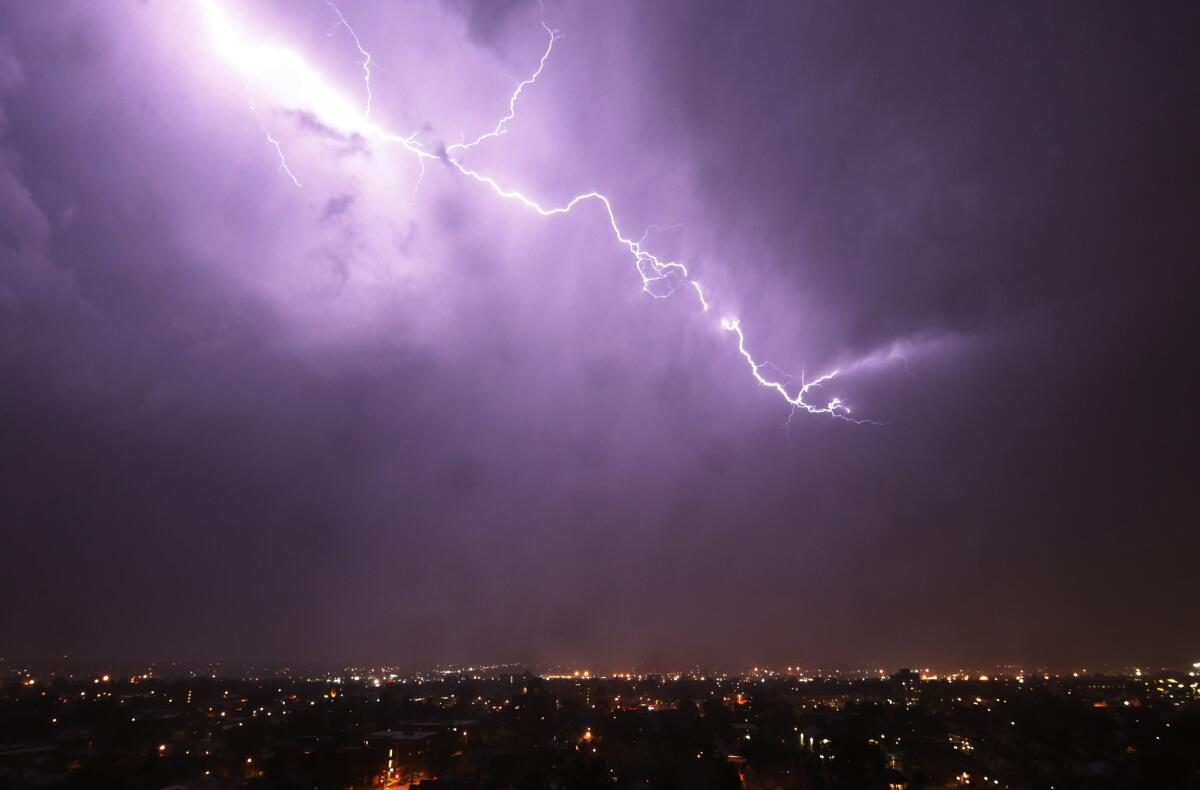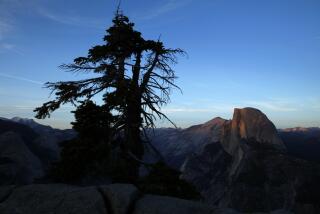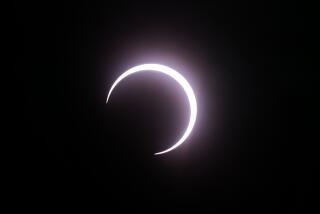Summer lightning over Rockies proves deadly, but Colorado hikers are undeterred

A bolt of lightning illuminates the sky as a summer storm packing high winds and heavy rains sweeps over downtown Denver last month.
- Share via
Reporting from Boulder, Colo. — Every summer, the call of the mountains lures thousands of Coloradoans into the high country, where they shake off winter’s gloom and immerse themselves in a world of light and space that approaches the magical.
Newlyweds Ryan Pocius, 32, and Kathleen Bartlett, 31, answered that call last Friday when they spent the final day of their honeymoon hiking 14,196-foot Mount Yale, about 133 miles southwest of Denver.
Bartlett never made it back.
While descending the summit amid the sunflowers and columbine, the athletic schoolteacher was hit by lightning. Her husband and fellow hikers struggled for 40 minutes, trying to resuscitate her, but it was too late.
“We were sharing a personal goal that we wanted to accomplish to set our marriage off right: peaking a 14er together,” Pocius wrote this week on his wife’s Facebook page. “She was so happy that day. … She was surrounded in a bed of wildflowers as far as the eye could see as she passed from this world to the next.”
Bartlett was the first fatality in a rash of lightning strikes that have hit nearly two dozen people in Colorado this year, a deadly continuation of the freakish weather that has seen record rainfalls, dozens of tornadoes and a Denver neighborhood buried in hail last month.
All of that moisture swirling around the atmosphere is now creating frequent, massive thunderstorms and with them, increased lightning, said National Weather Service meteorologist Stephen Hodanish.
Other states may see more lightning, he said, but Colorado ranks third nationwide in the number of people killed each year.
“That’s because we have a very outdoor-oriented culture here, and when you are in the mountains, you are very exposed to lightning,” Hodanish said. “If you are outside, there is really nothing you can do to reduce your risk.”
Lightning is a part of life in Colorado. On most summer days, black clouds boil up around noon, darkening the skies and unleashing guttural rumbles and sharp claps of thunder that can shake windows. Crowds gather at night on porches and in streets to watch flashes of lightning illuminate the sky like a million strobe lights.
Hikers are constantly advised to be off mountaintops by noon to avoid the storms. But now, those storms are arriving sooner, with lightning strikes recorded as early 10:30 a.m., meteorologists say.
Last month, a dozen hikers were injured by a single lightning strike while climbing the popular 14,060-foot Mt. Bierstadt outside Denver. One of them, Jonathan Hardman, saw his 7-month-old German shepherd, Rambo, killed in that incident. Doctors said the dog likely took the brunt of the strike, saving the other hikers.
“I’m just happy to be alive,” Hardman told a local television station, his upper body covered in “lightning trees,” patterns formed by burst capillaries. “I just wish I had my dog here with me.”
Investigators are looking into whether lightning played a role in the deaths of a father and son found in a tent near the Maroon Bells — among the most photographed twin peaks in North America — outside Aspen.
At the Mt. Sanitas trailhead in Boulder on Wednesday, Stacy Fox, 30, said she may abandon the time-honored Colorado tradition of bagging “fourteeners,” those iconic peaks topping 14,000 feet scattered around the state.
She’s already climbed three this year but said clouds are now rolling in around 10 a.m., leaving her feeling increasingly vulnerable to lightning.
“Fourteeners are addictive, but it’s pretty scary to be up there and suddenly have to race down,” she said. “After reading about what happened on Mt. Bierstadt, I’m not as obsessed by fourteeners anymore. I’m starting to focus on thirteeners instead.”
Hiker Christine Shiflett, 30, also said the lightning has caused her to rethink her mountain forays.
“It definitely makes us get out earlier and has made me wary of hiking fourteeners,” she said, preparing to go up 1,200-foot Mt. Sanitas. “Those guys on Bierstadt did all the right things, and they were still caught off guard.”
Bill Haneghan, director of technical climbing at the Colorado Mountain Club, lives by the weather forecast.
“We simply won’t go out when the skies are dark and the clouds are tall,” he said. “We always have all of our senses attuned to the skies. Given how much lightning I’ve seen in the Denver metro area, I can only imagine what it’s like in the backcountry.”
But the danger isn’t confined to the mountains. Four teenagers suffered minor injuries when lightning struck near a swimming pool in suburban Aurora last week. In May, another Aurora teen, 15-year-old Brian Tena Cardenas, was critically injured by lightning while crossing a field. And five construction workers were hurt by a strike in Colorado Springs.
Even when it doesn’t kill, surviving a lightning bolt packing up to 200,000 volts of electricity has life-changing consequences.
In her book, “A Match to the Heart,” author Gretel Ehrlich describes regaining consciousness after being struck by lightning on a Wyoming ranch.
“Everything was terribly wrong. I had trouble seeing, talking, breathing, and I couldn’t move my legs or right arm,” she wrote. “Nothing remained in my memory — no sounds, flashes, smells, no warnings of any kind. When thunder exploded over me, I knew I had been hit by lightning.”
Her book goes on to describe the shattering side-effects of living through a lightning strike: memory loss, physical pain, confusion, depression, mood swings and more.
Still, she survived.
Kathleen Bartlett wasn’t so lucky.
But her husband, Ryan, is committed to telling the world about his wife of barely two weeks who died on that mountain.
“Kate is and forever will be my wife,” he wrote on her Facebook page. “She loved me, her friends and the children she taught more than anything else and put us all above herself. We are blessed to have known her, to have been loved by her and to have been touched by her.”
He signed off as “Katie’s husband, her best friend, her sidekick and the luckiest guy in the world.”
More to Read
Sign up for Essential California
The most important California stories and recommendations in your inbox every morning.
You may occasionally receive promotional content from the Los Angeles Times.










